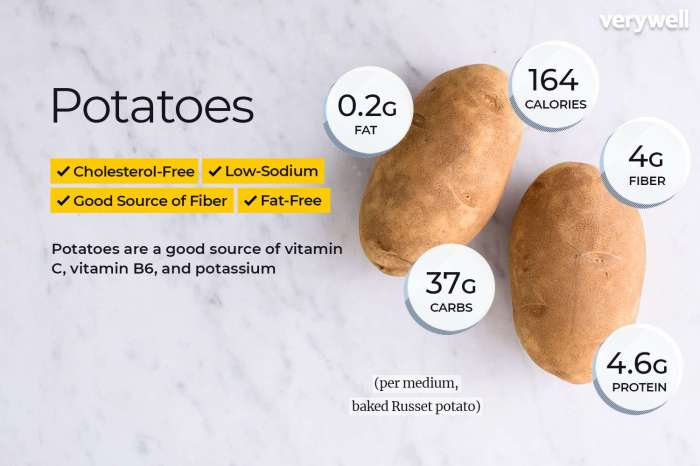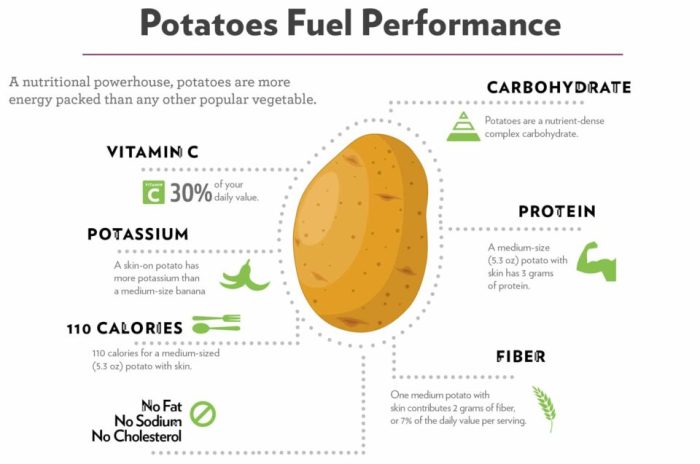Nutritional Composition of One Potato

1 potato nutrition facts – Potatoes are a surprisingly versatile and nutritious root vegetable, often underestimated in terms of their health benefits. A medium-sized potato offers a good source of several essential nutrients, contributing to a balanced diet. Let’s delve into the detailed nutritional breakdown.
Macronutrient Composition of a Medium-Sized Potato (150g)
A medium-sized potato (approximately 150g) provides a significant amount of carbohydrates, a moderate amount of protein, and a negligible amount of fat. The exact values can vary slightly depending on the potato variety and growing conditions. However, a general approximation is as follows:* Carbohydrates: Approximately 37g (12% of the recommended daily intake for a 2000-calorie diet). These carbohydrates are primarily in the form of starch, providing sustained energy.
Understanding the nutritional profile of a single potato, with its complex carbohydrates and potassium content, is crucial for balanced eating. However, comparing this to other foods, like checking the nutrition facts peter pan peanut butter , helps illustrate the diverse nutritional landscape. Returning to the potato, remember that its nutritional value also depends on preparation methods, highlighting the importance of mindful food choices.
Protein
Approximately 4g (less than 10% of the recommended daily intake for a 2000-calorie diet). While not a primary protein source, potatoes still contribute to overall protein intake.
Fat
Less than 1g (a negligible percentage of the recommended daily intake). Potatoes are naturally low in fat.
Micronutrient Content of One Potato
Potatoes are also a good source of various vitamins and minerals, playing a vital role in maintaining overall health. The following table summarizes the micronutrient content of a medium-sized potato:
| Nutrient | Amount (per 150g) | % Daily Value (2000-calorie diet) | Health Benefits |
|---|---|---|---|
| Vitamin C | ~19mg | ~21% | Supports immune function, antioxidant |
| Potassium | ~620mg | ~14% | Regulates blood pressure, supports muscle function |
| Vitamin B6 | ~0.3mg | ~15% | Essential for brain development and function |
| Phosphorus | ~80mg | ~8% | Important for bone health and energy production |
| Magnesium | ~25mg | ~6% | Supports muscle and nerve function |
Note
Daily value percentages are approximate and may vary depending on individual dietary needs.*
Nutritional Comparison: Baked, Boiled, and Fried Potatoes
The cooking method significantly impacts the nutritional profile of a potato.The following points highlight key differences:
- Baked Potatoes: Retain most of their nutrients and fiber, offering a healthier option. Minimal added fat or sodium.
- Boiled Potatoes: Similar to baked potatoes in nutrient retention, although some water-soluble vitamins might leach into the cooking water. Minimal added fat or sodium.
- Fried Potatoes: Significantly higher in fat and calories due to the added oil. Nutrient content can be reduced due to high heat. Often high in sodium due to added salt.
Health Benefits Associated with Potato Consumption

Potatoes, often unfairly maligned as unhealthy, offer a surprising array of nutritional benefits when consumed as part of a balanced diet. Their nutritional profile contributes to various aspects of health, from maintaining healthy blood pressure to supporting a robust immune system. Let’s delve into the specific health advantages linked to potato consumption.
Potassium’s Role in Blood Pressure Regulation, 1 potato nutrition facts
Potatoes are a good source of potassium, an essential mineral that plays a crucial role in regulating blood pressure. Potassium helps counter the effects of sodium, reducing its impact on blood vessel constriction. A diet rich in potassium can help lower blood pressure, thereby reducing the risk of heart disease and stroke. While the exact amount of potassium needed varies by individual, aiming for adequate potassium intake through foods like potatoes contributes positively to cardiovascular health.
For example, studies have shown a correlation between higher potassium intake and a reduced risk of hypertension.
Fiber’s Contribution to Digestive Health
Potatoes contain both soluble and insoluble fiber. Soluble fiber, like pectin, dissolves in water and forms a gel-like substance in the digestive tract, helping to regulate blood sugar levels and lower cholesterol. Insoluble fiber, on the other hand, adds bulk to the stool, promoting regular bowel movements and preventing constipation. The fiber content in potatoes contributes significantly to maintaining a healthy gut microbiome and overall digestive health.
A balanced intake of both types of fiber is crucial for optimal digestive function.
Vitamin C and Immune System Support
Potatoes, particularly when consumed with their skin, provide a decent amount of Vitamin C. This vitamin is a powerful antioxidant vital for immune function. Vitamin C supports the production of white blood cells, which are crucial for fighting off infections. Adequate Vitamin C intake helps strengthen the body’s natural defenses against various illnesses. The vitamin C content in potatoes, combined with other nutrients, contributes to overall immune system health.
Other Potential Health Benefits from Potato Compounds
Beyond potassium, fiber, and Vitamin C, potatoes contain various other beneficial compounds, including antioxidants. These antioxidants help protect cells from damage caused by free radicals, reducing the risk of chronic diseases. Specific potato compounds are being studied for their potential roles in reducing inflammation and improving overall health. While research is ongoing, the presence of these compounds suggests a broader range of potential health benefits associated with potato consumption.
Potatoes in a Balanced Diet
Potatoes, often unfairly maligned, can be a valuable part of a healthy and balanced diet. Their nutritional profile, rich in potassium and vitamin C, contributes significantly to overall well-being when incorporated thoughtfully. Understanding how to select and prepare them is key to maximizing their benefits and avoiding potential pitfalls.
A well-planned diet featuring potatoes can provide a good source of essential nutrients without excessive calories or unhealthy fats. This requires mindful portion control and attention to preparation methods.
Sample Meal Plan Incorporating Potatoes
This sample meal plan demonstrates how potatoes can be integrated into a balanced daily diet, highlighting their versatility and nutritional value. Portion sizes should be adjusted based on individual caloric needs and activity levels.
Breakfast: Potato and Vegetable Frittata. A frittata made with diced potatoes, spinach, onions, and eggs provides protein, fiber, and essential vitamins.
Lunch: Leftover Potato and Vegetable Frittata (or a large salad with baked potato wedges). This ensures you’re getting a balanced meal with minimal effort.
Dinner: Baked Salmon with Roasted Rosemary Potatoes and Green Beans. This provides lean protein, healthy fats, and fiber. The rosemary adds flavor without extra calories.
Potatoes in Various Dietary Patterns
Potatoes’ adaptability makes them suitable for various dietary approaches. Careful consideration of preparation methods and accompanying ingredients is crucial for maintaining dietary adherence.
Below are examples of how potatoes can fit into different dietary patterns. Remember that portion control and overall meal composition remain essential for health.
- Vegetarian: Potato and lentil stew, potato and vegetable curry, potato gratin with cheese and vegetables.
- Vegan: Roasted potatoes with herbs and spices, potato and chickpea salad, potato and vegetable stir-fry.
- Low-Carb: While potatoes are a carbohydrate source, incorporating them in moderation is possible within a low-carb diet. Focus on smaller portions and choose low-starch varieties like red potatoes, preparing them in ways that don’t add excessive fat (e.g., baked, not fried).
Guidelines for Choosing Potatoes
Selecting the right potato for a specific dish significantly impacts the final outcome. Consider size, variety, and intended use to optimize taste and texture.
The following guidelines help in making informed choices when purchasing potatoes.
- Size: Smaller potatoes tend to be more tender when boiled or roasted, while larger ones are better suited for mashing or baking.
- Variety: Russet potatoes are ideal for baking and mashing due to their fluffy texture. Red potatoes hold their shape well when boiled or roasted. Yukon Gold potatoes offer a creamy texture and mild flavor, suitable for various applications.
- Intended Use: Consider the cooking method and desired texture when selecting a variety. For example, waxy potatoes like red potatoes are best for salads and roasting, while starchy potatoes like russets are better for mashing and baking.
Question Bank: 1 Potato Nutrition Facts
Are sweet potatoes healthier than regular potatoes?
Sweet potatoes generally have a higher vitamin A content and a lower glycemic index than regular potatoes, but both offer valuable nutrients.
Can I eat potato skins?
Absolutely! Potato skins are packed with fiber and nutrients. Just make sure to wash them thoroughly.
Are potatoes fattening?
Potatoes themselves aren’t inherently fattening, but how you prepare them makes a big difference. Fried potatoes are high in calories, while baked or boiled potatoes are much healthier options.
What’s the best way to store potatoes?
Store potatoes in a cool, dark, and dry place. Avoid refrigeration, as this can affect their taste and texture.



